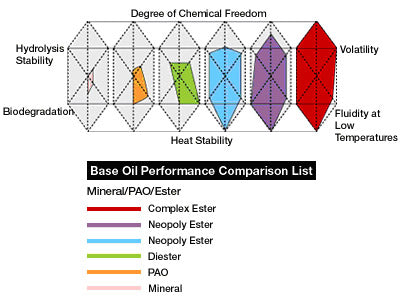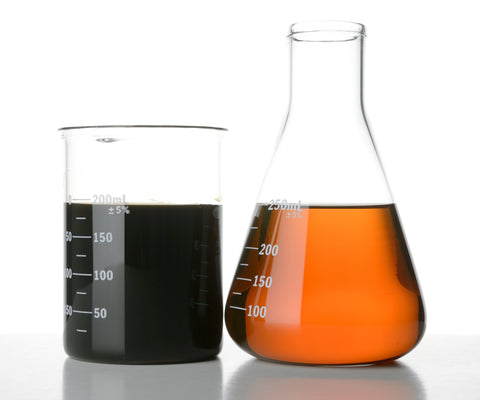FAQ
Q: What is the difference between mineral oil and synthetic oil?
A: Mineral oil (Dino oil) comes from the ground and goes through a refining process. Most of these base oils are a byproduct of fuel refining and are quite limited in their ability to perform. True Synthetics are created in a laboratory and are molecularly engineered to perform by design; that is why Synthetic oils can have a lower cold start viscosity, like a 0W (a 0 weight oil flows like water at 0 degrees C).

Q: I have heard that some synthetics in the market are actually mineral oils with fancy marketing hype, is this true?
A: It's true, some of these oils are actually highly refined mineral oils, after an unprecedented battle in US courts, this refining process was deemed to have enough human involvement to be called "a Synthetic oil" and so, this opened the doors for some smart marketers to call their products "Synthetic".
![]()
Q: What kind of synthetic base stock are used in the motul product?
A: Motul known for their mastery of ester technology; uses the best in base stock technology; depending on the application, Motul uses Ester, PAO, and a small combination of Group III base stocks.

Q: What is a Factory Approval - or - What is an OEM Approval?
A: "Meets or exceeds" is not a Factory Approval! A Factory Approval or OEM Approval (Original Equipment Manufacturer Approval) is issued by the automotive manufacturer directly to the oil manufacturers. Motul will work with the automotive manufacturers to develop a lubricant to exact oil specification to to use in a specific engine. The oil specification that is developed will be a carefully selected and tested. It will be comprised of a blend of both base oils and additives that are specified to suit the given engine’s requirements. Once the exact formulation is achieved oil samples are then provided to the OEM for their own internal testing (sometime internally or at an independent lab) to ensure the oil complies fully with the specifications. If the oil tested is found to be fully compliant, then the OEM will issue a "certificate of approval" that proves the lubricant has met the specification. These certificates will be dated and usually lasts between one and five years. Even though many OEMs have strict requirements to achieve full approval of a lubricant to ensure it is the correct lubricant for a given engine, many oil manufacturers will not apply for the approval certification. Testing to gain OEM approval can be very expensive and in some cases oil manufacturers do not consider it necessary or do not want to go through the expense or process. They will claim they "meet or exceed" but can not completely back this fact as they have never been put to the test by the OEM or factory. And this certification becomes even more important if an engine is still under warranty.

Q: What do the "Starburst / Donut" and the alpha-numeric numbers on the back of the bottle represent?
A: They are the systems issued by the sanctioning bodies to define the performance levels of the lubricant. The API "Donut" has three sections that identifies that the oil meets current API engine oil standards. The top section shows what API standards are met by the oil, the centre shows the SAE viscosity grade of the oil, and the bottom can include other important performance parameters - in this case the motor oil has resource-conserving properties.

Q: Why is that important to me? Oil is oil!
A: On the contrary! These standards systems are quite ambiguous; the North American and European standards are far apart, so understanding these systems will help you get what you pay for when you are buying your oil.
API / ILSAC American Petroleum Industry, is the primary sanctioning body for lubricants in North America. The weakness of the API system is the inability to position one approved product as an upgrade over another. Manufactures engineer and build cars that have varying degrees of performance and technologies, having one blanket oil standard for a wide variety of cars doesn't make sense.
| YEAR | API | ILSAC |
|---|---|---|
| 1994-1996 | SH | GF-1 |
| 1997-2000 | SJ | GF-2 |
| 2001-2004 | SL | GF-3 |
| 2005-2010 | SM | GF-4 |
| 2011-present | SN | GF-5 |
ACEA European Automobile Constructors Association, is chaired by representatives of the car manufacturers and not oil company executives. This association is geared towards the requirements of specific cars and technologies. Utilizing a system of concurrent standards based on engine technology and performance requirements under progressively tougher testing methods, achieves oils that allow the engines to operate to their true potential.
| Criteria | Gasoline | Diesel | SAPS | Drain Interval |
|---|---|---|---|---|
| Fuel Economy[FE] | A1 | B1 | C1 | <15,000 kms |
| Hi Performance / Turbo + Long drain | A3 | B3/B4 | C2 | >15,000 kms |
| Hi Performance + FE Turbo + Long drain | A5 | B5 | C3 | <30,000 kms |
Q: What are saps?
A: Sulphated Ash, Phosphorus and Sulphur are components of the additives package in engine oils. With new low emissions exhaust technologies, these compounds have been shown to clog and damage the sensitive catalytic converters and particulate filters. New oil standards have mandated reduced SAPS oils; you will find this latest technology in the Motul line up.
Q: I see Motul products ranging from 300V, 8100, to 6100 ETC. What is the difference?
A: Motul products are categorized from our best and highest technology to the lower technologies. Which product is right for you will depend on your needs and requirements.
300V is our most advanced base stock featuring double ester technology, a true racing product used by top race teams in the international arena yet available to car aficionados. Due to its exceedingly high standards, many passionate enthusiasts are using this product in their high performance street cars.
8100 Premium Synthetic is our most advanced synthetic base stock, using Ester and PAO technology, these products surpass the latest Manufactures’ Approvals with flying colours, longer drain intervals and fuel economy for maximum efficiency and protection for your investment.
6100 Synthetic utilizes our advanced base stock with Group III technology; these products achieve the latest Manufactures’ Approvals with recommended drain intervals and fuel economy improvements.

